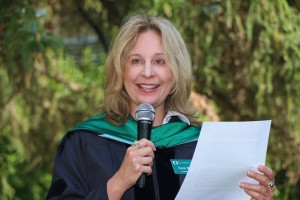 This week’s post is the transcript of AIM Program Director Kara McFall’s 2016 commencement address. Commencement took place Saturday, August 13 on the University of Oregon main campus in Eugene.
This week’s post is the transcript of AIM Program Director Kara McFall’s 2016 commencement address. Commencement took place Saturday, August 13 on the University of Oregon main campus in Eugene.
To our 2016 AIM graduates, their families and supporters; our AIM faculty and staff; and all others who are here to join in the celebration of our 2016 AIM graduating class—welcome. I’d like to start by asking the graduates, faculty, and staff to stand or raise a glass and join me in honoring the families and friends who supported our graduates throughout the AIM Program. Every one of our AIM graduates has worked hard to achieve the right to stand here today as a graduate of the program; but every graduate also had the help and support of their families and loved ones, who agonized along with them over proper APA citations, assignment deadlines, and their nitpicky Capstone 1 instructor. The role that each of you played—as supporters of our AIM graduates—is an important one, and I would like to say thank you.
You are here today with no looming paper deadlines, no assignments that are due, no need to meet with your classmates to complete a team project. I hope you’ve had time to enjoy your new role as AIM alumni and the transition from your previous role as AIM students. I’ve spent the time since your newfound freedom writing and rewriting this address. I struggled honestly with how to frame my message to you, and I finally decided to take inspiration from the 2016 presidential race. Please bear with me.
The fact is, I love politics, and every election cycle I find myself caught up in the campaigns. As a political fanatic of many years, I’ve noticed over time that while each campaign is different, there are some parallels that are universal. In particular, political candidates have a set of terms that they’ve coopted and, in every election cycle, you’ll hear these terms lobbed at the opposition. For my address today, I will be applying those terms to you, our latest AIM graduates. My fellow Americans, I present you with the following indisputable facts about the AIM graduating class of 2016.
First, I would like to state for the record that AIM graduates are flip floppers. In a political campaign when you hear the term flip flopper, it comes when one candidate accuses the other of changing positions on an issue, oftentimes with videotaped evidence showing a candidate proclaiming to take one side of an issue, and at another time proclaiming to take the exact opposite side. I believe that flip flopping is a virtue, and it is my sincere hope that you as AIM alumni live up to the name. There is a reason why we asked you to research and write so many papers exploring various topics during your time in the AIM Program. The intent was not to encourage you to take a rigid stance, but rather for you to learn to gather evidence from sources; examine the sources critically to ensure they meet the five criteria of being of high quality, authoritative, timely, relevant, and lacking in bias; and then, based upon the information you’ve gathered and assessed, make a determination of your position on a topic. We gave you similar opportunities in discussion boards, where our hope was to provide a forum for the exploration of important and timely topics and to foster debate with your classmates and your instructor. I know through working with all of you that some, if not all of you, are emerging from the AIM Program having changed your positions on different topics – you have engaged in flip flopping, and I am proud of you for doing so. The opposite of a flip flopper is someone who is rigid and refuses to learn and grow, someone who clings to a belief despite overwhelming evidence to the contrary. I hope that you will continue to base your positions not on what you believed yesterday, but rather that you will continue to gather information, examine what you find critically and, when warranted, that you will change your stance and embrace your role as a flip flopper.
Next, I would like to point out, ladies and gentlemen, that AIM graduates are uninformed. This may seem like an odd statement for the director of a master’s program to say to a group of graduates who have spent considerable time and resources in obtaining their degrees, so let me explain what I mean. I hope that your time in the AIM Program has taught you that, however much you think you know about a topic, there is always more to learn. I sincerely hope that each of you who leaves the program as an AIM graduate has nurtured or developed a love of learning. Once you have settled into your role as AIM alumni, I want you to continue to fuel your desire to learn by embracing the fact that you don’t know everything—that there are topics on which you are uninformed. I can think of no worse fate than knowing everything—to be stripped of the opportunity for the joy of discovery. I hope that saying the words “I didn’t know that” come to mean not the admission of ignorance, but instead to represent the opportunity to indulge a continued love of learning.
Finally, I would like to take a moment to talk about failure. Before you get your backs up, let me share my philosophy on failure. Everyone—everyone—fails in achieving a goal at some point in their lives. Those who fail the most are those who have tried the most. Most of us have a hard time when we fail to reach a goal—it’s a horrible feeling and, for goal-oriented people, having to admit that you’ve failed at something can be devastating. Reactions can range from defensiveness—explaining why you didn’t actually fail or why the failure was someone else’s fault—to feelings of negative self worth. I have students every year who view a less than perfect grade on an assignment or in a class as failure, and I understand—grades and what they represent are important, and most of you came into the AIM Program with goals related to your grades. But I hope that one of the lessons you take from the AIM Program is to look at failure to reach a goal as a gift. I want to repeat those words, because the lesson is the single most valuable lesson I have learned in my own life: Failure is a gift. Failure gives you the opportunity to honestly assess why you fell short in your efforts and identify opportunities for you to hone your skills or alter your approach, or even to sometimes let go of one goal for the opportunities represented by another. I want to encourage you to approach failure with grace and with gratitude, and to treat each failure to reach a goal as a gift that provides the opportunity to learn something new about yourself or the world, to improve, and to move in a new direction. I challenge you all to embrace your failures.
To sum up—I hope the AIM Program has provided you with the skills and confidence to pursue the knowledge that will enable you to flip flop on issues rather than remain rigid in your stances, that you will continue to seek out topics on which you are uninformed so that you can indulge a love of learning, and that you will embrace your failures for the opportunities they present. I also hope that you are able to embark on your post-AIM journeys without CNN chronicling your every step. AIM Class of 2016, I am proud of each one of you, and I don’t need an exit poll to tell me that all of you are winners. I hope you will take the opportunity to keep in touch with us as you move into your next phase as AIM graduates. Congratulations to you, AIM Class of 2016!


